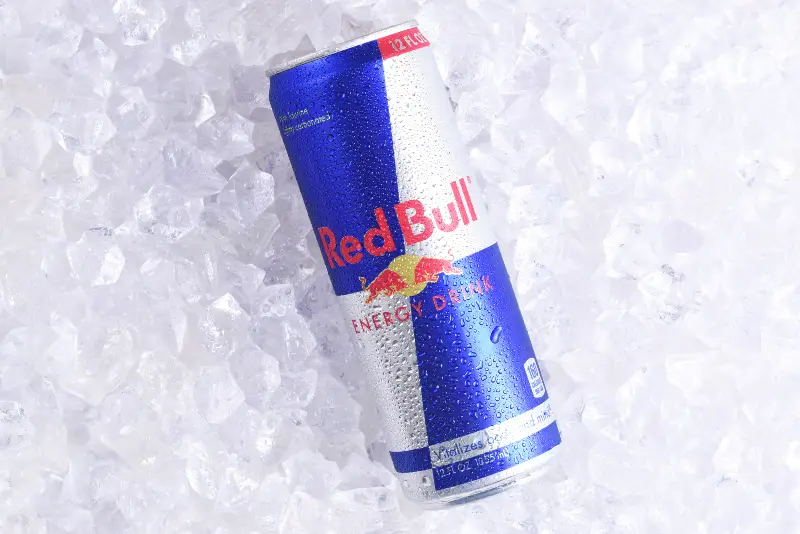Red Bull is an energy drink that can boost your performance, concentration, and reaction time. You may consider consuming one when you need that extra push, whether you’re studying for exams, engaging in sports, or needing to stay alert for a project.
But how long does the vitality provided by a can of Red Bull last, and what are the factors influencing this duration?
Understanding the nuances of Red Bull’s energy boost can make a significant difference in how you plan your activities.
What Ingredients in Red Bull That Can Boost Your Energy
Did you think what exactly in that 8.4 fl oz (250ml) Red Bull can is working to give you that burst of energy? The primary ingredients include caffeine, taurine, B-group vitamins, sucrose and glucose, alpine water, and a suite of other elements designed to work in synergy to enhance your energy levels and alertness.
Each of these ingredients has a role to play. Caffeine quickly perks you up, taurine supports neurological function, B-group vitamins aid in metabolism, and simple sugars provide a quick source of fuel, whereas water is vital for the overall biochemical reactions in the body.
Let’s break down the key ingredients:
Caffeine (80 mg)
This is the powerhouse behind the energy boost. Caffeine is a stimulant that affects the central nervous system to reduce tiredness and improve concentration.
Taurine (1000 mg)
An amino acid that is naturally occurring in the human body. Taurine has been shown to have several health effects, such as potentially improving exercise performance and possibly even cardiovascular health.
B-group Vitamins
These include vitamin B3 (niacinamide), vitamin B5 (pantothenic acid), vitamin B6, and vitamin B12. These vitamins help to convert food into energy, thus playing a role in maintaining normal energy-yielding metabolism.
Sucrose and Glucose (27g)
Simple sugars that provide an immediate source of energy due to their rapid absorption in the body.
Alpine Water
Water is essential for all bodily functions, including energy production.
Average Duration of Red Bull Energy
After drinking a Red Bull, you may feel more awake and focused almost immediately, with peak energy levels occurring around 15 to 45 minutes post-consumption when caffeine levels peak in your bloodstream.
This is when you’re likely to feel the most noticeable effects, as the caffeine and sugars go to work. The energy-boosting effects of Red Bull can last between one to several hours, but this will vary from person to person. On average, you might expect to feel energized for about 2-4 hours.
However, it’s worth noting that the ‘crash’ that can follow this heightened energy period may leave you feeling tired once the sugar and caffeine wear off.
The body metabolizes caffeine at different rates, but generally, about half of the caffeine consumed is cleared from your body within 4-6 hours. After this, you may begin to notice a decline in the energy levels provided by Red Bull.
Factors Affecting Red Bull Energy Last Time
Not everyone experiences the same duration of energy after having a Red Bull. A number of individual factors can influence how long you feel the effects.
Caffeine Tolerance
Regular intake of caffeine can lead to increased tolerance, meaning that over time, the same amount of caffeine provides less of an energy boost. If you frequently consume caffeinated beverages, you may find the effects of Red Bull less pronounced or shorter-lived.
Food Consumption
Drinking Red Bull on a full stomach, as opposed to an empty one, can also influence its energizing effects.
The presence of food in the stomach can slow the absorption of caffeine into the bloodstream, leading to a more gradual increase in energy that might last longer but won’t feel as intense.
Physical Activity
Engaging in physical activity after consuming Red Bull might alter how long and how intensely you feel the energy surge. Exercise increases blood flow, which could help to distribute the caffeine and sugar more quickly throughout your body, possibly intensifying and shortening the burst of energy.
Individual Metabolism: Age, Weight, Overall Health
Metabolism plays a critical role in how your body processes the ingredients in Red Bull. Younger individuals, those with higher body weight, or those in good health generally metabolize caffeine faster.
Your overall health, including liver function and if you are a smoker or not, also affects metabolism rates, thereby impacting how long the energy-boosting effects last.
Sleep Patterns
Lack of sleep can affect how caffeine influences you. If you’re sleep-deprived,
you might feel the effects of Red Bull more quickly because your body is desperate for energy. On the flip side, the lack of rest might also mean the effects wear off sooner as your body is already running on empty.
Hydration Level
Being well-hydrated is crucial for maintaining energy levels. Dehydration can lead to fatigue, meaning that if you drink Red Bull when you’re dehydrated, you might not feel as sharp or energized for as long because your body needs to deal with the lack of water first.
Medications and Supplements
Some medications and dietary supplements may interact with caffeine, potentially altering its stimulant effects. Always consult with a healthcare provider about how energy drinks may interact with any medications or supplements you are taking.
Can You Drink Too Much of Red Bull Energy Drink to Stay Energized?
While Red Bull can indeed give you the energy boost you’re looking for, moderation is key. As mentioned earlier, one 8.4 fl oz can contains 80 mg of caffeine.
The European Food Safety Authority (EFSA) considers a caffeine intake of up to 400 mg per day to be safe for most adults, which equates to about 5 cans of Red Bull.
However, individual sensitivity to caffeine varies, and some people might experience adverse effects at lower doses. It’s important to listen to your body and be mindful of other sources of caffeine you consume throughout the day, such as coffee, tea, chocolate, or other energy drinks.
Moreover, the high sugar content in Red Bull can contribute to an increased risk of weight gain, insulin resistance, and dental issues if consumed excessively.
It’s also imperative to consider that energy drinks can be particularly risky for children, pregnant or nursing women, and individuals with certain medical conditions or who take certain medications.
While Red Bull can offer a temporary energy boost, it’s not a substitute for a good night’s sleep, regular physical activity, and a balanced diet. Drink Red Bull in moderation, and be aware of how your body responds to it, ensuring you stay within a safe consumption range.
If you rely heavily on energy drinks and find it difficult to maintain energy throughout the day, seeking advice from a healthcare professional is advisable to discuss healthier strategies for energy management.
Responsible Consumption and Alternatives
Given the risks associated with high consumption of energy drinks like Red Bull, it’s important to practice responsible consumption. If you find the need for an energy boost, try to limit yourself to just one can and not every day.
Also, consider whether you might be better off with a less intense stimulant, or even a non-caffeinated option.
For those who are sensitive to caffeine or looking for healthier alternatives to maintain their energy levels, here are a few suggestions:
- Stay Hydrated: Dehydration can cause fatigue. Make sure you’re drinking plenty of water throughout the day.
- Balanced Meals: Eat regular meals with a good mix of protein, fats, and carbohydrates to maintain energy levels.
- Natural Sugars: Snack on fruits for a quick energy boost without the sugar crash that often follows high-sugar processed products.
- Exercise: Regular physical activity can increase your energy levels overall and improve sleep quality, negating the need for energy drinks.
- Power Naps: Short naps of around 20 minutes can help refresh your mind and improve alertness without disrupting your nighttime sleep.
Conclusion
Red Bull can be helpful when you need an occasional energy boost. However, you need to be mindful of their temporary nature and the individual factors that determine how long their effects will last for you.
By understanding your body, your tolerance to caffeine, and the contextual factors like diet and exercise, you can enjoy the benefits of Red Bull when you really need it.
Also, considering the not-so-long-lasting energy they provide, it’s also wise to explore sustainable ways of maintaining energy. To optimize your energy levels for the long run, focus on establishing a healthy lifestyle with balanced nutrition, adequate sleep, regular physical activity, and proper hydration.





